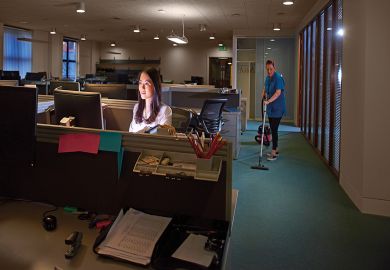Figures released this week show the Universities Superannuation Scheme, which covers academics and academic-related staff in pre-1992 universities, remains severely under-funded.
The fund’s deficit in March 2013 was £11.5 billion – up from £9.8 billion last year, according to a valuation released this week in its annual report.
Its assets also grew in 2012 – up from £33.9 billion to £38.6 billion – by 14 per cent.
But its liabilities – the cost of paying all promised benefits – also increased substantially to £50.1 billion, which means the USS is only 77 per cent funded, the same funding ratio as in 2012.
Its finances had improved slightly by June 2013, with liabilities falling to £45.8 billion owing to interest rate rises, assets standing at £37.9 billion and a deficit of £7.9 billion – an 83 per cent funding ratio, according to an interim valuation.
However, unless the deficit is massively reduced in time for the scheme’s triennial valuation next year, a recovery plan will need to drawn up ensure the scheme’s long-term viability.
Steps may include higher employee contributions – final salary members currently pay 7.5 per cent of their salaries – to fund future payments or universities increasing their contributions, which stand at 16 per cent.
USS is currently developing a “formal holistic funding plan” ahead of the 2014 valuation, said Sir Martin Harris, former vice-chancellor of the University of Manchester and USS chairman.
However, the deficit may be worse than USS estimates if it is valued using the formula used by private companies – known as FS17.
Using the FS17 formula, the estimated £7.9 billion deficit in June would actually stand at £10.5 billion, according to pensions consultant John Ralfe, former finance director at Boots.
To clear the deficit over 20 years, university contributions would need to rise from about £1 billion to £1.8 billion a year. That would be the equivalent of tuition fee rises of about £1,000 a year, he said.
Employee contributions would also need to rise to 10 per cent of an individual’s salary – effectively a pay cut for staff, he added.
In his introduction to this year’s annual report, Sir Martin admits the fund was facing “undoubtedly challenging times”. He said the holistic plan would include a review of employers’ contributions, the scheme’s investment strategy and a reassessment of actuarial assumptions, such as life expectancy of members.
The possibility of higher contributions follows the implementation of a recovery plan in 2011, which required members and universities to increase their pension payments.
Final salary pension schemes were also closed to new members.
Some 20,000 members are now on career-average schemes from an active population of 148,000 active members, with a total member population of 300,000, according to this week’s annual report.
It was also announced this week that USS, which is one of the UK’s largest pension funds, acquired a £392 million stake in Heathrow Airport after buying 8.65 per cent of FGP Topco Limited, the holding company which owns Heathrow Airport Holdings Limited.
A USS spokeswoman said it has been “entirely transparent” about the deficit figures and provided comprehensive estimates to institutions on an annual basis.
“USS has made changes to both benefits and contribution levels in recent years to deal with historic deficits and will continue to work with employers and members’ representatives to agree a recovery plan which is commensurate with the long-term nature of the scheme,” she said.
“The employers have made it clear there is no suggestion that tuition fees will be increased to provide additional funding for the scheme.”
Register to continue
Why register?
- Registration is free and only takes a moment
- Once registered, you can read 3 articles a month
- Sign up for our newsletter
Subscribe
Or subscribe for unlimited access to:
- Unlimited access to news, views, insights & reviews
- Digital editions
- Digital access to THE’s university and college rankings analysis
Already registered or a current subscriber? Login




